 “I consider trial by jury as the only anchor ever yet imagined by man, by which a government can be held to the principles of its constitution…” Thomas Jefferson
“I consider trial by jury as the only anchor ever yet imagined by man, by which a government can be held to the principles of its constitution…” Thomas Jefferson
The death of Trayvon Martin during an altercation with George Zimmerman prompted calls for a national discussion about race relations that went all the way to President Obama. The verdict of not guilty renewed calls for a “national discussions” about race, self-defense and “stand your ground”. A national discussion that should be had centers on the faith that the Founders placed upon juries as the ultimate bulwark against both government power and political passion.
Angela Corey‘s bypassing the Grand Jury forced emotional trial appeals by the prosecution which asked trial jurors to ignore the law and goes to the rights of all Americans. A discussion needs to be had as to why state prosecutors can avoid grand juries.
Juries, The Declaration of Independence and The Constitution
The Declaration of Independence‘s grievances against King George included: “For depriving us in many cases, of the benefits of Trial by Jury”. Juries are mentioned five times in the Constitution and the Bill of Rights. Juries have protected against government power and political passion for over 200 years. Grand Juries have been an element of that protection and should be a part of national discussion as well.1
Constitutional jury provisions are to protect citizens from the misuse of government power. The Zimmerman case shows the danger when the government avoids a jury and the citizen protections when the government must involve a jury.
How Zimmerman Came to be Tried: Early Investigation, Aborted Plan for Grand Jury
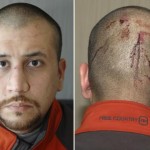 On February 26, 2012 a tragic altercation between Trayvon Martin and George Zimmerman resulted in the shooting death of Mr. Martin. Immediately afterward Zimmerman asserted self-defense. The initial investigation of the Sanford Police Department found no evidence to the contrary.2 Mr. Zimmerman was not immediately arrested. Following a March 8, 2012 press conference by Mr. Martin’s family a national movement arose to arrest and charge Zimmerman with a crime.
On February 26, 2012 a tragic altercation between Trayvon Martin and George Zimmerman resulted in the shooting death of Mr. Martin. Immediately afterward Zimmerman asserted self-defense. The initial investigation of the Sanford Police Department found no evidence to the contrary.2 Mr. Zimmerman was not immediately arrested. Following a March 8, 2012 press conference by Mr. Martin’s family a national movement arose to arrest and charge Zimmerman with a crime.
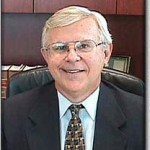 Authority to investigate an incident and charge a crime normally belongs to the elected local prosecutor.3 In this case, it was State Attorney Norman Wolfinger.4 On March 12, 2012, Sanford police turned the investigation over to Mr. Wolfinger’s office. Groups like the Florida Civil Rights Association became involved, calling on Gov. Scott to appoint a special prosecutor. On March 20, 2012 Wolfinger announced that a grand jury5 would be convened to determine charges. Involving private citizens of a grand jury in high profile matters serves the public interest by removing charging decisions from a political official and protects potential defendants from possible political prosecutions. The nature of the Martin/Zimmerman matter fit this scenario.
Authority to investigate an incident and charge a crime normally belongs to the elected local prosecutor.3 In this case, it was State Attorney Norman Wolfinger.4 On March 12, 2012, Sanford police turned the investigation over to Mr. Wolfinger’s office. Groups like the Florida Civil Rights Association became involved, calling on Gov. Scott to appoint a special prosecutor. On March 20, 2012 Wolfinger announced that a grand jury5 would be convened to determine charges. Involving private citizens of a grand jury in high profile matters serves the public interest by removing charging decisions from a political official and protects potential defendants from possible political prosecutions. The nature of the Martin/Zimmerman matter fit this scenario.
Press conferences and public demonstrations expressed dissatisfaction that Zimmerman had not been arrested. On March 22, 2012, Wolfinger6 asked Gov. Scott to assign another state attorney to the investigation.7 That same day the Governor appointed State Attorney Angela B. Corey.8 On April 9, 2012, Ms. Corey canceled Wolfinger’s scheduled grand jury.
 Ms. Corey’s confidence in the evidence against Zimmerman9 might be doubted by the decision to remove citizen review of possible charges. Ms. Corey charged Zimmerman with Second Degree Murder two days after canceling the grand jury. Absent a grand jury indictment a Florida prosecutor must submit a sworn affidavit of probable cause. Ms. Corey proceeded by affidavit, and Harvard Law Professor Alan Dershowitz soon opined that Ms. Corey had criminally submitted a false affidavit.10
Ms. Corey’s confidence in the evidence against Zimmerman9 might be doubted by the decision to remove citizen review of possible charges. Ms. Corey charged Zimmerman with Second Degree Murder two days after canceling the grand jury. Absent a grand jury indictment a Florida prosecutor must submit a sworn affidavit of probable cause. Ms. Corey proceeded by affidavit, and Harvard Law Professor Alan Dershowitz soon opined that Ms. Corey had criminally submitted a false affidavit.10
In federal criminal cases the Constitution requires a prosecutor to develop enough evidence to convince private citizens of a grand jury to pursue felony criminal charges. Why should a state prosecutor not have the same responsibility? The grand jury‘s role should be the subject of a national discussion.11
The Right to a Jury Trial and Expectations of Jurors
The Constitution has two provisions for criminal jury trials. Art. II, Section 2 provides: “The Trial of all Crimes, except in Cases of Impeachment, shall be by Jury…” The Sixth Amendment provides: “In all criminal prosecutions, the accused shall enjoy the right to a speedy and public trial, by an impartial jury…” Unlike the Constitution’s Grand Jury protections, the Supreme Court has determined that the Jury Trial protections are mandatory in state criminal prosecutions.12
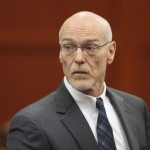 Historically, jurors’ independent knowledge of the actors involved in a case was thought to be of benefit in reaching a fair verdict.13 Experience has shown one element of avoiding juror bias is to find jurors with no knowledge of the people involved in the case14 This principle was the basis for Don West’s ill advised knock knock joke opening Zimmerman’s defense.
Historically, jurors’ independent knowledge of the actors involved in a case was thought to be of benefit in reaching a fair verdict.13 Experience has shown one element of avoiding juror bias is to find jurors with no knowledge of the people involved in the case14 This principle was the basis for Don West’s ill advised knock knock joke opening Zimmerman’s defense.
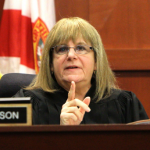 American jury evolution has designated jurors to be finders of fact. They are to be presented evidence and determine contested facts. They are then to apply the law given to them by the judge.15 Judge Debra Nelson’s instructions reflect this principle:
American jury evolution has designated jurors to be finders of fact. They are to be presented evidence and determine contested facts. They are then to apply the law given to them by the judge.15 Judge Debra Nelson’s instructions reflect this principle:
“You must follow the law as it is set out in these instructions. If you fail to follow the law, your verdict will be a miscarriage of justice. There is no reason for failing to follow the law in this case. …
This case must be decided only upon the evidence that you have heard from the testimony of the witnesses and have seen in the form of the exhibits in evidence and these instructions. …
This case must not be decided for or against anyone because you feel sorry for anyone, or are angry at anyone. ….
Your verdict should not be influenced by feelings of prejudice, bias or sympathy. …”
The Arguments of the Zimmerman Lawyers in Light of the Jury Instructions
“When the law is on your side, argue the law.
When the facts are on your side, argue the facts.
When neither the facts nor the law are on your side, appeal to emotion.”
In a typical criminal prosecution the state presents the facts and asks the jury to apply the law as given by the judge to the evidence and make a finding of guilt beyond a reasonable doubt. The defense points out the shortcomings of the government’s evidence and argues it did not dispel reasonable doubt. Judge Nelson instructed the jury to: “…. not be influenced by feelings of prejudice, bias or sympathy. Your verdict must be based on the evidence, and on the law contained in these instructions.”
Despite those standard instructions, most attorneys look for ways to have jurors relate to actors involved in a case so that decisions are in part driven by a prejudice, bias or sympathy that they believe exists in the jury. Most often, the state will rely on facts and law, and the defense will craft an emotional appeal to encourage a jury to overlook the facts and law.
 As the facts and law favored self-defense for Zimmerman, the standard approach was reversed in the case. Mark O’Mara for the defense argued the facts and law.16 O’Mara promised to prove Zimmerman’s innocence beyond a reasonable doubt. In closing, he recounted the evidence, reviewed the witnesses and used visual aids to bring home the facts of the case. Mr. O’Mara argued the facts and the law.
As the facts and law favored self-defense for Zimmerman, the standard approach was reversed in the case. Mark O’Mara for the defense argued the facts and law.16 O’Mara promised to prove Zimmerman’s innocence beyond a reasonable doubt. In closing, he recounted the evidence, reviewed the witnesses and used visual aids to bring home the facts of the case. Mr. O’Mara argued the facts and the law.
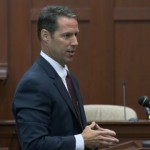 Assistant State Attorney John Guy’s final argument began with the functions of the “human heart”.17 Mr. Guy admitted he had “no audio clips or charts”. Mr. Guy mentions “that child” three times in three sentences. He states: “This is not a case of common sense.” About two-thirds through, Mr. Guy begins to describe “reasonable doubt”. Mr. O’Mara interrupts him. Why? Because Guy is misinforming the jury about the law.18
Assistant State Attorney John Guy’s final argument began with the functions of the “human heart”.17 Mr. Guy admitted he had “no audio clips or charts”. Mr. Guy mentions “that child” three times in three sentences. He states: “This is not a case of common sense.” About two-thirds through, Mr. Guy begins to describe “reasonable doubt”. Mr. O’Mara interrupts him. Why? Because Guy is misinforming the jury about the law.18
Shortly thereafter, Mr. Guy concludes as he begun, paraphrasing Voltaire: “To the living we owe respect, but to the dead we owe the truth.” This sums up the duty of the jury. Repeated references to “human heart”, “that child” “not a case of common sense” and misstating the law of reasonable doubt are not appeals to truth, but to emotion.
Mr. O’Mara argued the facts and the law. Mr. Guy appealed to emotion. O’Mara had the facts and law.
The trial jury sorted through the evidence and the arguments. They provided the intended constitutional protection against the power of the government and the passion of the public. They rendered a dispassionate verdict consistent with the law and the facts.
State’s Trial Attorneys Did Not “Lose”; The Faith in Juries Vindicated; Grand Juries Should be Required in State Prosecutions
Much discussion has been devoted to why the prosecution “lost” the case. A criminal case is not something the state “loses”. The trial attorneys cannot create facts, they only take what is available and put it before a jury. The state’s duty is not to win, but to do justice in presentation to both sides.
Mr. de le Rionda and Mr. Guy did the best with what they had. The trial jury vindicated the value of the constitutional guarantee to restrain the government and remove criminal matters from political passions.
The state’s error was in not seeking a grand jury indictment and the citizen protections a grand jury provides. With all the talk of “national discussion” on race, self-defense and “stand your ground”, it is time to ask: Why does the federal constitutional guarantee of a grand jury indictment not apply to state prosecutions?
ALAN DERSHOWITZ, MAY 19, 2012: IMPROPER FILING OF ZIMMERMAN CHARGES.
WOULD A GRAND JURY HAVE INDICTED ON SUCH EVIDENCE?
______________________________________________________________________________________________________________________________________________________________
1The “national discussion” that has been taking place has centered around inequities of race in the criminal justice system. Racial issues are important and generate headlines, but the use/misuse of juries in the Zimmerman matter has been overlooked.
2When self-defense is raised by any evidence, it becomes the state’s burden to prove beyond a reasonable doubt that the claim is unreasonable. It was apparent the Sanford Police did not find evidence to dispute Mr. Zimmerman’s claim.
3The job of a prosecutor is unique in the legal system. The sole duty of a prosecutor is to seek justice. When I was a prosecutor and stood in front of the court announcing myself on “Behalf of the People”, I always remembered that the defendant was one of “the people” and my duty to seek justice on his behalf was as great as to the victims.
4Wolfinger had served for 27 years as State Attorney, and decided not to seek reelection. In January, 2013 he was succeeded by Phil Archer.
5A grand jury is one of the protections against misuse of government provided for in the Constitution. The Fifth Amendment provides: “No person shall be held to answer for a capital, or otherwise infamous crime, unless on a presentment or indictment of a Grand Jury” A grand jury is composed of citizens to determine if the government has evidence to pursue criminal charges. That 5th Amendment provision applies only to federal prosecutions; states are not required to use a grand jury to initiate criminal charges. In Florida, a grand jury is used at the prosecutor’s discretion, except in possible death penalty cases when a grand jury is mandatory.
6Only two days after scheduling a grand jury investigation.
7On March 22, 2012, Rev. Al Sharpton emceed a rally of thousands in Sanford, FL demanding Zimmerman’s arrest. Rallies took place that same day in Pittsburgh, Toronto and Australia.
8An experienced State Attorney asked to be removed only two days after scheduling a grand jury, and the Governor made an appointment that same day. A reasonable conclusion is that the investigation of the Martin/Zimmerman matter had moved from the realm of law enforcement to the realm of politics.
9It’s said a grand jury would indict a “ham sandwich” if the prosecutor requests it. Grand jury proceedings are secret, hears only evidence from the prosecutor, and a judge is not usually present (then only for limited purposes). With that structure, grand juries nearly always indict upon the prosecutor’s request. While reports indicate that Ms. Corey’s usual procedure is to not employ a grand jury, her action in this matter overruled Wolfinger’s decision.
10Ms. Corey apparently called Harvard and threatened the school with a lawsuit. Dershowitz’ criticism has been ongoing, and his belief is that she acted unethically and perhaps even criminally in prosecuting Zimmerman.
11Even with the “ham sandwich” saying, (Footnote #7) placing citizens in the line of charging decisions makes prosecutions better. Often the most critical decision is to file a charge. Because of government power and possible prison sentences, many innocent defendants agree to plea bargains after being charged with a serious crime. Prosecutors free to file serious charges absent citizen review often choose the most serious crime remotely available. This creates incentive for the defendant to agree to a reduced crime and penalty. Would private citizens participate in proceeding in that way? Might a Zimmerman Grand Jury have insisted on Manslaughter?
12The Supreme Court has determined that specific constitutional guarantees are imposed upon the states by the 14th Amendment’s Due Process Clause. The Court made jury trials mandatory for state prosecutions, but has not done so for the initiation of criminal charges by a grand jury. In Hurtado v. Califorina, (110 US 516, 1884) the Supreme Court held that the grand jury requirement does not apply to the states. More recently however, the Court noted in McDonald v. Chicago (2010) fn. 12, the court noted that the Hurtado was decided before the Court began incorporating the Bill of Rights against the states under the 14th Amendment.
13 Before juries, unusual ways of deciding guilt or innocence existed: Trial by: 1) battle 2) ordeal and 3) compurgation. Trial by battle required the accused to fight with the accuser or the accuser’s representative. Victory showed innocence; loss showed guilt. An example of trial by ordeal required swallowing a large piece of food. An innocent person swallowed; the guilty choked. Compurgation was a method of trial in which an accused person could summon a specified number of people, usually 12, to swear to their belief in his or her innocence. Whatever the issues with America’s current system, it’s come a long way.
14Potential jurors should not only have no knowledge of the actors in the case themselves, but none of the lawyers, police, or possible witnesses.
15When jurors render a verdict that is contrary to law they exercise Jury Nullification. Once an inherent right of juries as the ultimate check on government power, in most jurisdictions for a lawyer to mention nullification to a jury can be grounds for a mistrial or sanctions imposed upon a lawyer. Emotional appeals are thinly veiled requests for Jury Nullification.
16The law of self-defense as applied in the Zimmerman matter is not new. It may be 1,000 years old. The talk of Florida’s controversial “stand your ground” law as it relates to this case was never invoked, because it never applied.
17A subtle reference to the fact that Trayvon Martin was shot through the heart.
18After O’Mara’s interruption, there’s a conference with the judge. After the conference the judge advises the jury she will instruct them on the law. Guy changes his tack, because he was misstating the law.






[…] George Zimmerman murder trial brought issues of self-defense into the national spotlight. The jury instructions in the […]